- Home
- Robert B. Parker
A Savage Place s-8 Page 7
A Savage Place s-8 Read online
Page 7
“You may go in now,” she said. She didn’t like saying that either.
The rug as we walked toward the door was deep enough to lose a dachshund in. I opened the door for Candy. It was hung so precisely that it seemed weightless. Candy took a deep breath.
I said, “I’m right beside you, babe.”
She smiled and looked at me briefly and nodded. “I’m glad you are,” she said. Then we walked through the door.
Chapter 11
WE WERE IN a room lined with bookshelves. There was leather furniture around and, on a round mahogany table in the middle of the room, a large globe. At the other end of the room was another door. It was open. The room beyond the open door seemed very bright. Candy preceded me. Sneezy, Grumpy, and Doc were sitting on a long couch to our right. The wall opposite the door was all glass, and the long green view of the L.A. Country Club below was a dazzler. In front of the wall, at right angles to the couch, was a desk about the size of Detroit. Behind it sat a man with large white teeth and dark hair flecked with gray. His face was deeply tanned. He wore a dark blue pin-striped suit with a vest that had lapels. His tie was an iridescent gray-blue tied in a small knot under a white pincollar. He looked like the centerfold in Fortune.
He said, “You’re Miss Sloan. I’ve seen you on the news. And your associate?”
Candy said, “Mr. Spenser.”
“I’m Peter Brewster,” he said. “This is Tom Turpin, our director of corporate public relations.” He gestured at the guy with the glen plaid and the shabby shoes. “And Barrett Holmes, our legal counsel”-the gymnast with the dimpled chin. “And Rollie Simms. Mr. Simms is our director of corporate security.” I grinned at Candy. “Since I understand you are about to level an accusation, I thought it would be prudent to have these gentlemen witness it. Barrett, if it’s actionable, I’ll want you to take steps immediately.”
I said to the trio on the couch, “Excuse me, but which one of you three guys speaks no evil?” Brewster gave me a basilisk stare.
He said, “I have very little time for humor.”
I said, “But an awful lot of occasion.”
He gave me that stare again.
Candy said, “Mr. Brewster, I have information that organized crime has infiltrated Summit Studios: Do you have any comment on that?”
“Shouldn’t you take that question to Roger Hammond at Summit?”
“I have.”
“And his response?”
“He had us put off studio property.”
Brewster nodded. “The nature of your information?”
“I can’t give you details, but I have an eyewitness.”
“To what?”
“To a transaction involving Summit personnel and a member of the Los Angeles underworld.”
“And the nature of that transaction?”
“A payoff.”
Brewster nodded again. He looked at me. “Is this your eyewitness?”
“No.”
“Who is your eyewitness?”
Candy shook her head. “He’ll have to remain anonymous for now.”
“Of course,” Brewster said. “Of course he would. You media types are all the same, aren’t you. You have information but you can’t give me specifics. You have an eyewitness, but he’ll have to remain anonymous.”
“Do you wish to comment on the allegations?” Candy said.
“The allegation is without foundation,” Brewster said. “And you are without professional ethics. I shall be discussing you with the management of KNBS shortly.”
“I’m only trying to do my job, Mr. Brewster,” Candy said.
“And I seriously doubt that you’ll have a job for very much longer,” Brewster said.
“You mean, you’re going to get me fired?” Candy’s gaze was final, but her voice had softened a little.
“Precisely,” Brewster said.
I looked at Holmes, the lawyer. “Is that actionable?” I said.
“And I am sick of your smart mouth too,” Brewster said. He did his stare again. “Who is your superior?”
“I have none,” I said. “I’m not sure I even have an equal.”
“Spenser,” Candy said, “please! You’re not helping. Do you have any statement for me, Mr. Brewster?”
“I’ve made it. Now I want you both off of Oceania property. Now.”
Candy said, “Mr. Brewster-”
Brewster said, “Now.”
Simms, the security type with the tinted glasses, got to his feet.
I looked at him. “Simms,” I said, “this horse’s ass that you work for has made me very edgy. If you do anything more than stand up, I will put you in two weeks of traction.”
Simms said, “Hey.”
“I mean it,” I said. “Sit down.”
Candy’s face was flushed. She moved in front of me. “Come on,” she said. “You’re making it worse. Come on. I want to go home.”
Brewster pushed his desk intercom. “Miss Blaisdell,” he said, “send some security people in here at once.”
Candy said, “See what you’ve done. Come on, let’s get out of here.”
I said, “It is not dignified to run off like this.”
“Come on,” she said and headed for the door. There was nothing left there for me to do. Telling Brewster he’d be hearing from me seemed graceless. I thought about kicking him, but by the time I got around the desk, the entire security force would be setting up gun emplacements in the reception room. I lingered another few seconds, hoping that Simms would lay hold of me. No luck. Nobody moved. Everyone looked at me. I felt like I’d stumbled into an Italian Western.
Candy was out the office door. She wasn’t waiting. I was supposed to guard her. I went after her. On the way out I picked the globe off the table in the booklined room and dropped it on the floor. That oughta fix ‘em.
Chapter 12
IN THE ELEVATOR there were tears in Candy’s eyes. In the parking garage her lower lip was shaky. In her car, pulling out onto Santa Monica Boulevard; she cried.
As we passed Bedford Drive I said, “If you’ll tell me why you’re crying I’ll buy you a large frappeed margarita at the Red Onion, and maybe a nacho supreme.” She sobbed. We crossed Camden.
I said, “It’s down here, on Dayton at Beverly. You keep sobbing and driving and you’ll miss an outstanding margarita.”
She kept crying, but she turned right on Rodeo, drove down past stores that sold eight-hundred-dollar farmer’s overalls, and parked near the corner of Dayton. Then she put her head down on the steering wheel and wept full out. I cranked the seat back as far as it would go on my side of the MG and leaned back and stretched my legs out and folded my arms on my chest and rested my head and closed my eyes and waited.
It took about five more minutes before she stopped. She straightened back in the seat, turned the rearview mirror toward her, and began to look at her face. Her breathing was still irregular, and a half sob caught her breath. She took makeup from her purse and began to readjust her face. I was still. When she got through she said, “Let’s go.”
We walked down to the Red Onion. Pink stucco, Mexicanesque tile, a bar on one side of the foyer and the dining room on the other. The bar was full of young women with very narrow backsides wearing very tight jeans with designer labels on the back pockets. They were talking with very young men with very narrow backsides wearing very tight jeans with designer labels on the back pockets.
We went to the dining room and each drank a margarita. Then we ordered two nacho supremes and another margarita. The waitress went away.
I said, “What happened at Oceania to make you cry?”
“They were so”-she shook her head-“they were so… mean.”
“Nice guys work in the mailroom,” I said.
She nodded. The waitress brought more margaritas. “I know,” Candy said. “I know that. I mean, it’s the same in broadcasting. I know. But they were so-” She raised both hands slightly from the table, made a small open gesture, and le
t them drop.
“First of all why do you say `they‘? The three clucks on the couch barely spoke. Simms just made a few security-chief noises. How else would we know he was tough?”
“Well, it was really”-she twirled the stem of her glass-“it was really just him, I guess, and the rest of them looked threatening.”
“ ‘Him’ being Brewster?”
“Yes.”
“He scared you by his talk of going to the station management?”
“No, not scared me. But…” She drank some of the margarita. It was a pale green. “A station manager is quite often friends with big shots in town. I mean, they really can make waves when the license comes up for renewal, or when they talk with other big shots about where they advertise.”
“You could get fired?”
“Well, it’s possible. Or not get more money or not get good assignments. Get a troublemaker reputation-first Hammond, and now Brewster complaining to the station.”
“That made you cry?”
“Not just that.”
“What else?”
“Well, I was alone and they were all there.”
“Well, you weren’t absolutely, completely, one hundred percent alone,” I said.
“You were making it worse.”
“Admitted. I have trouble keeping my mouth shut in boardrooms and penthouses and executive suites and stuff. It’s a bad habit. But I was still on your side. You weren’t alone.”
“You’re a man,” she said.
I had been leaning forward with my elbows on the table. I sat back and put my hands in my lap. “Jesus Christ,” I said.
“I was alone in there with five men, four of them actively hostile. It’s very hard. You don’t know what that’s like. He dismissed me like I was a beetle. A bug. Nothing. `Get out,‘ he said, `I’m going to speak to your boss.’ ”
“Jesus.”
“And my boss will say, `Sure, Pete, old pal, she’s a pushy broad. I’ll let her go.”‘
I took one hand out of my lap and rubbed the lower part of my face with it. The nacho supremes came. We ordered two bottles of Dos Equis beer.
“Okay,” I said. “You’re afraid for your job.”
Her eyes were filling again. “The only woman,” she said.
“Only woman is true,” I said. “Alone is not true.”
“You wouldn’t understand.”
Suze, where are you when I need you. “Talk a little more,” I said.
“Maybe I will.”
“You weren’t with me. You were there to protect me.”
“Ah-hah,” I said.
She looked at me. There was no humor in her look. Her eyes were wet and her face was somber. “What’s that mean?” she asked.
“It means, loosely, oh-oh. It means that since I’ve been with you, you’ve been between ScyIla and Charybdis. You need me to protect you, but the need compromises your sense of self.”
“It underscores female dependency.”
“And in the office up there, you were scared. And being scared, you were glad I was with you, and that underscored the female dependency even more.”
She shrugged.
“And when you told me you could get information from an agent you used to sleep with, you weren’t showing off your liberation, you were being bitter. You were trying to make light of your feeling that to get what you needed, you had to go to a man and get an I.O.U. in return for sexual favors, or something like that.”
She poked at her food with her fork, and ate a small bite. The nacho was about the size of a bluefin tuna. When they said supreme, they meant supreme.
“Something like that. You misunderstood.”
“Yes, I did. Now I don’t.”
“Maybe.”
I finished my beer.
Candy smiled at me a little. “Look,” she said. “You’re a good guy. I know you care about me, but you’re a white male, you can’t understand a minority situation. It’s not your fault.”
I gestured at the waitress for another beer. Candy hadn’t touched hers. Appalling.
While I waited for the beer, I worked on the nacho. When the beer came, I drank about a quarter of it and said to Candy, “Extend that logic, and we eventually have to decide that no one can understand anyone. Maybe the matter of understanding has been overrated. Maybe I don’t have to understand your situation to sympathize with it, to help you alter it, to be on your side. I’ve never experienced starvation either, but I’m opposed to it. When I encounter it, I try to alleviate it. I sympathize with its victims. The question of whether I understand it doesn’t arise.”
She shook her head. “That’s different,” she said.
“Maybe it isn’t. Maybe civilization is possible, if at all, only because people can care about conditions they haven’t experienced. Maybe you need understanding like a fish needs a bicycle.”
“You’re quite thoughtful,” she said, “for a man your size.”
“You never been my size,” I said. “You wouldn’t understand.”
Chapter 13
THE COPS FOUND Mickey Rafferty lying in the open door of his room at the Marmont with his feet sticking out into the hall and three bullets in his chest. Someone had heard shots and called the cops. but no one had seen anything and no one knew anything.
Candy and I got this from a cop named Samuelson in the empty studio where, mornings from nine to ten, a talk show called New Day L.A. bubbled and frothed. It was four fifty in the afternoon. Candy had some news to read at six.
“We found him this morning,” Samuelson said, “about twelve hours ago. We talked to some people at the studio. They said he was close to you.”
Candy’s face was pale and blank. She sat on a sofa on the set, her legs crossed, her hands in her lap. She nodded.
“I’m sorry to be the one to tell you,” Samuelson said.
Candy nodded again. Samuelson was sitting on one corner of the anchor desk, his arms folded. He was square-faced and nearly bald, with a large drooping mustache and tinted glasses in gold frames.
“Way I figure it happened,” he said, “someone knocked on the door, and when he opened it, they shot him in the chest.”
Candy shook her head with little rapid movements, almost as if she were shivering.
“You got anything else?” I said.
“Not so far,” Samuelson said. He was chewing gum and occasionally cracked it. “Hoping maybe Miss Sloan would be able to help us.”
Candy shook her head. “I don’t know anything,” she said. “I don’t have any idea why someone would want to kill Mickey.”
“How about you, Boston?” Samuelson popped his gum at me.
“No,” I said, “I only met him once.”
“I know this is a tough time to talk about it, Miss Sloan,” Samuelson said. “But I would like to talk some more when you can. Maybe tomorrow?”
Candy nodded.
“Maybe you could come downtown,” Samuelson said. “Tomorrow, maybe around two in the afternoon, say.” He took his wallet out, slipped a card from it, and gave it to Candy. “If you can’t make it then, give us a call, and we’ll arrange a better time.”
Candy took the card.
Samuelson looked at me. “Wouldn’t it be a coincidence if Rafferty getting burned had something to do with this investigation you’re helping with, Boston.” I shrugged.
“If it turned out that way, you’d get in touch with us right away, wouldn’t you, Boston.” He gave me a card too.
“It’s every citizen’s duty,” I said.
“Yeah, okay.” Samuelson unfolded from the anchor desk. He was tall and looked in shape, not heavy, but like a tennis player or a swimmer. He moved smoothly.
“I’ll be looking for you tomorrow, Miss Sloan. You come too, Boston,” he said.
Candy said yes, not very loud. And Samuelson went out of the studio. It was dead quiet. The weighted studio door swung shut. Candy got up from the couch and walked over to it and looked out through the small double-glas
s window. Then she walked back over and stood beside me.
“They killed him,” she said.
“I gather we’re not telling the cops everything we know?” I said.
“They killed Mickey,” Candy said. “Doesn’t that-” She spread her hands.
“There are all kinds of things it does,” I said. “But trying to talk about it is inadequate. If they did kill him and they are the same people that had you beat up, then it says they are in earnest.”
“You mean they might try to kill me?”
“They might. But I won’t let them.”
Candy turned and walked away, across the empty studio, stepping carefully over the lash of cables on the floors, and on the far side of the studio, she stopped, turned back, leaned her arms on a camera, and put one foot up on the bumper ring that went around the lower end of the dolly.
“You think you are very tough, don’t you. People die, people are hurt. You’re matter-of-fact about it, aren’t you. `They might try to kill you, girlie, but don’t worry about it. I’ll take care of you. Big strong me.‘ Well, what if they kill you. You ever think of that?”
“No more than I have to,” I said.
“Wouldn’t be manly, would it.”
“Wouldn’t do any good,” I said.
She stared at me over the body of the camera. “What’ll we do, Spenser?” she said. “What in hell will we do?”
“Some of it you have to decide,” I said. “Maybe you have already. For instance what do we tell Samuelson and how much? A few minutes ago you told him nothing. You going to stick with that?”
“Should I?”
“Not my decision,” I said.
“I’m afraid, if they know, they’ll get involved in the whole deal and everyone will shut up and I won’t get a story.”
“Or they might dig it out and clean it up,” I said. “They can do that sometimes.”
“But it would be them, not me. I want this. I don’t want a bunch of cops getting it.”
“If the cops are involved, there’s not much reason for the bad guys to harm you anymore,” I said. “Their whole point is to keep you from the cops.”

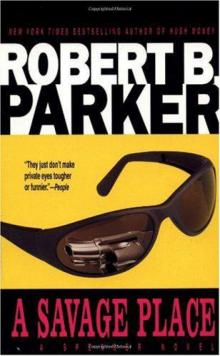 A Savage Place s-8
A Savage Place s-8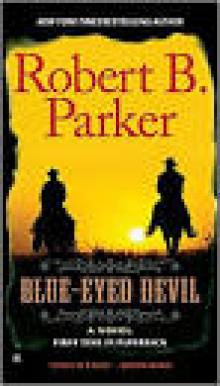 Appaloosa / Resolution / Brimstone / Blue-Eyed Devil
Appaloosa / Resolution / Brimstone / Blue-Eyed Devil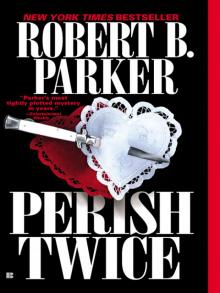 Perish Twice
Perish Twice Spare Change
Spare Change Family Honor
Family Honor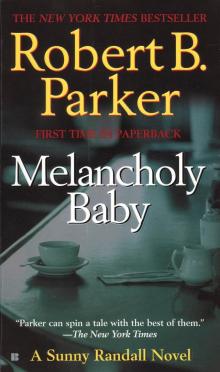 Melancholy Baby
Melancholy Baby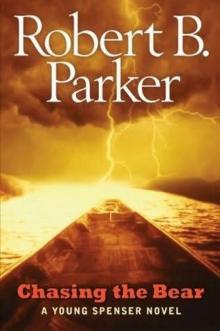 Chasing the Bear
Chasing the Bear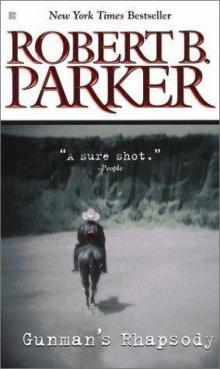 Gunman's Rhapsody
Gunman's Rhapsody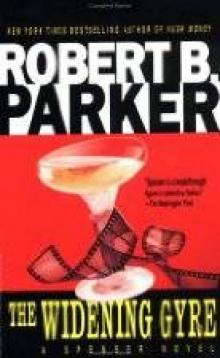 The Widening Gyre
The Widening Gyre Thin Air
Thin Air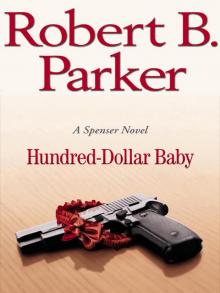 Hundred-Dollar Baby
Hundred-Dollar Baby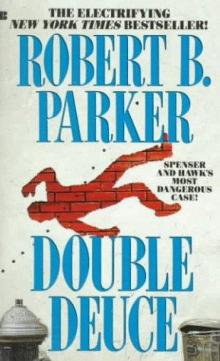 Double Deuce s-19
Double Deuce s-19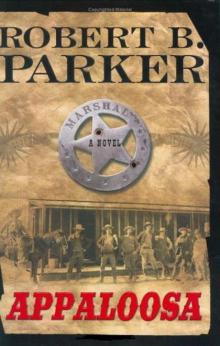 Appaloosa vcaeh-1
Appaloosa vcaeh-1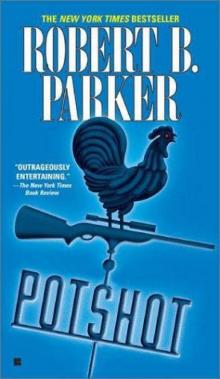 Potshot
Potshot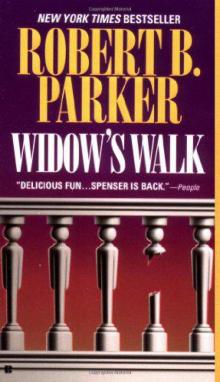 Widow’s Walk s-29
Widow’s Walk s-29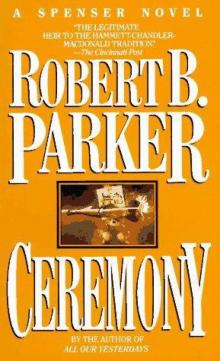 Ceremony s-9
Ceremony s-9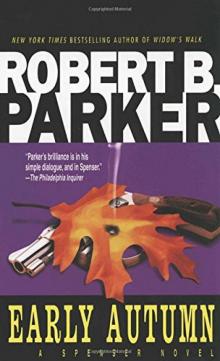 Early Autumn
Early Autumn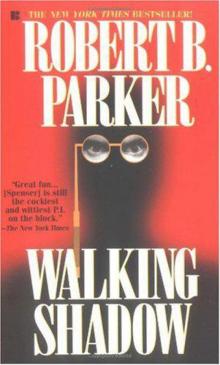 Walking Shadow s-21
Walking Shadow s-21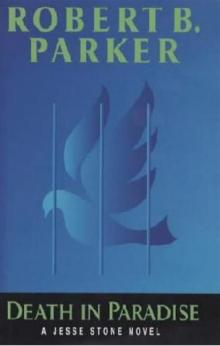 Death In Paradise js-3
Death In Paradise js-3 Shrink Rap
Shrink Rap Blue-Eyed Devil
Blue-Eyed Devil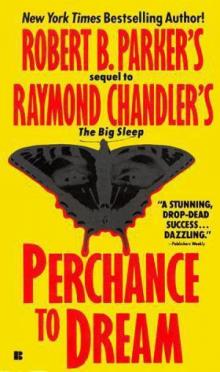 Perchance to Dream
Perchance to Dream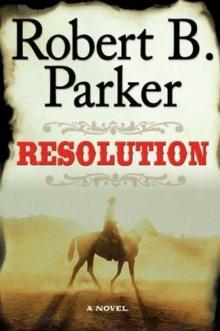 Resolution vcaeh-2
Resolution vcaeh-2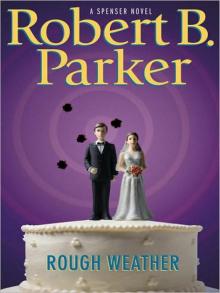 Rough Weather
Rough Weather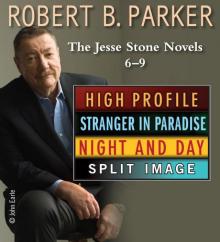 The Jesse Stone Novels 6-9
The Jesse Stone Novels 6-9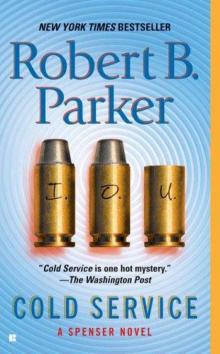 Cold Service s-32
Cold Service s-32 The Godwulf Manuscript
The Godwulf Manuscript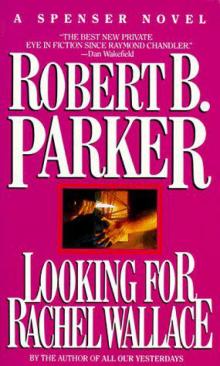 Looking for Rachel Wallace s-6
Looking for Rachel Wallace s-6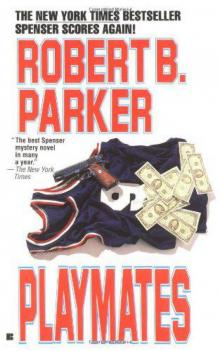 Playmates s-16
Playmates s-16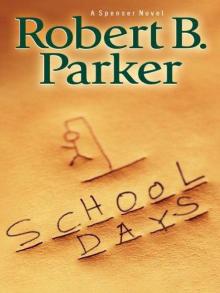 School Days s-33
School Days s-33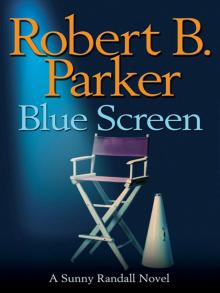 Blue Screen
Blue Screen Crimson Joy
Crimson Joy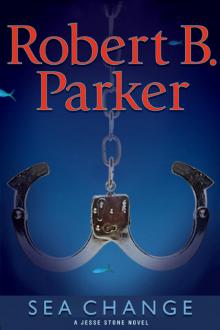 Sea Change js-5
Sea Change js-5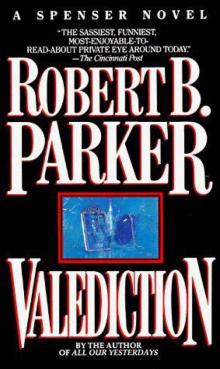 Valediction s-11
Valediction s-11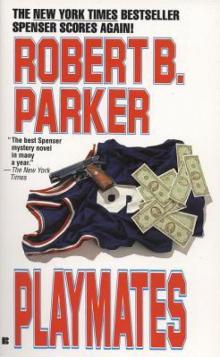 Playmates
Playmates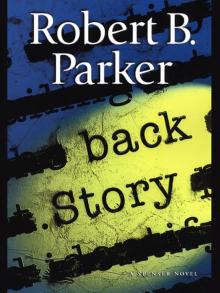 Back Story
Back Story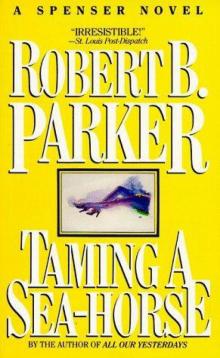 Taming a Sea Horse
Taming a Sea Horse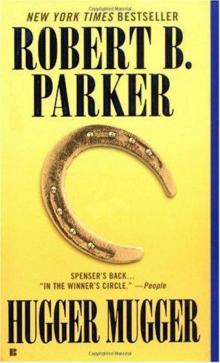 Hugger Mugger
Hugger Mugger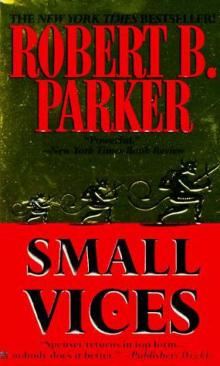 Small Vices s-24
Small Vices s-24 Silent Night: A Spenser Holiday Novel
Silent Night: A Spenser Holiday Novel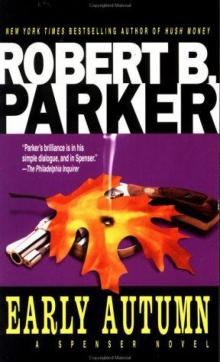 Early Autumn s-7
Early Autumn s-7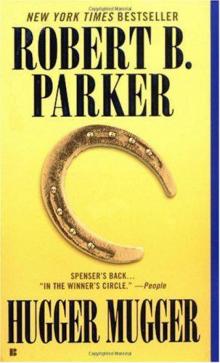 Hugger Mugger s-27
Hugger Mugger s-27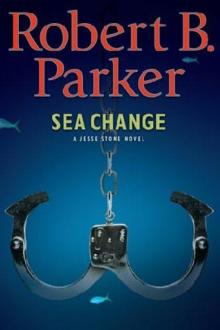 (5/10) Sea Change
(5/10) Sea Change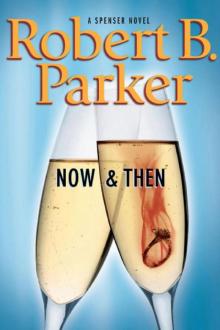 Now and Then
Now and Then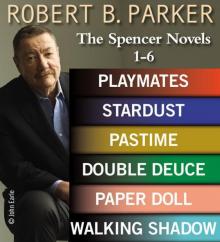 Robert B. Parker: The Spencer Novels 1?6
Robert B. Parker: The Spencer Novels 1?6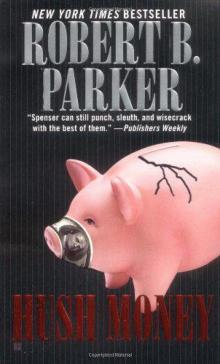 Hush Money s-26
Hush Money s-26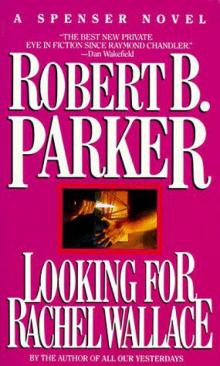 Looking for Rachel Wallace
Looking for Rachel Wallace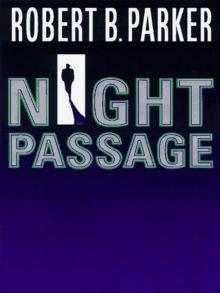 Night Passage
Night Passage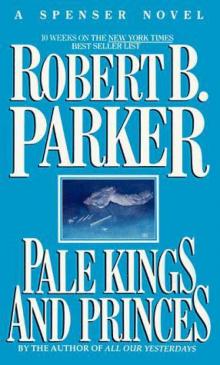 Pale Kings and Princes
Pale Kings and Princes All Our Yesterdays
All Our Yesterdays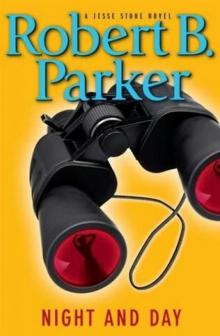 Night and Day js-8
Night and Day js-8 Stranger in Paradise js-7
Stranger in Paradise js-7 Double Play
Double Play Crimson Joy s-15
Crimson Joy s-15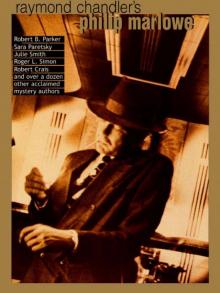 Raymond Chandler's Philip Marlowe
Raymond Chandler's Philip Marlowe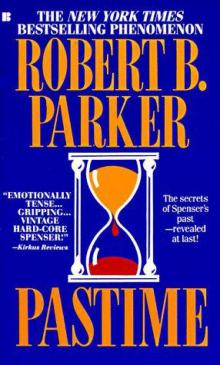 Pastime
Pastime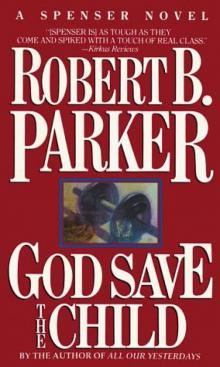 God Save the Child s-2
God Save the Child s-2 Bad Business
Bad Business Trouble in Paradise js-2
Trouble in Paradise js-2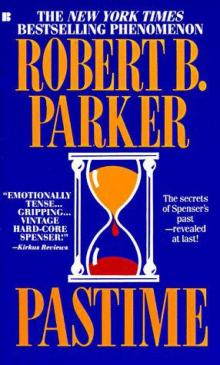 Pastime s-18
Pastime s-18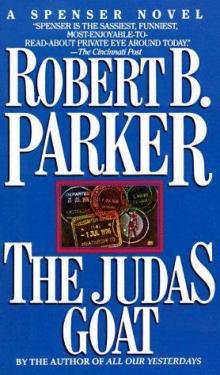 The Judas Goat s-5
The Judas Goat s-5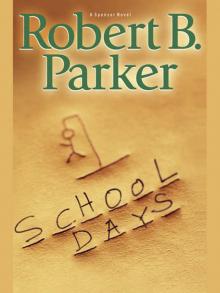 School Days
School Days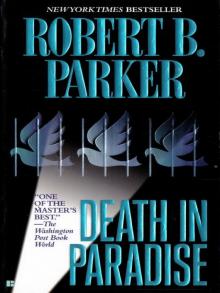 Death In Paradise
Death In Paradise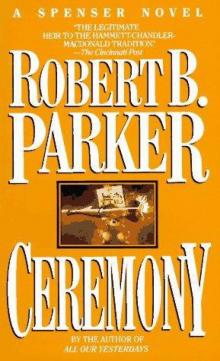 Ceremony
Ceremony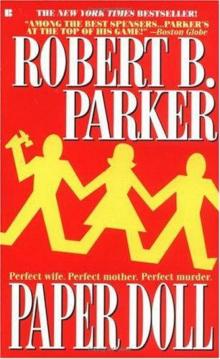 Paper Doll s-20
Paper Doll s-20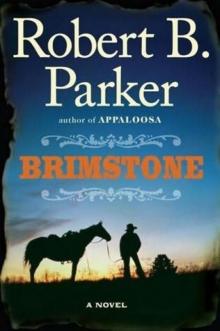 Brimstone vcaeh-3
Brimstone vcaeh-3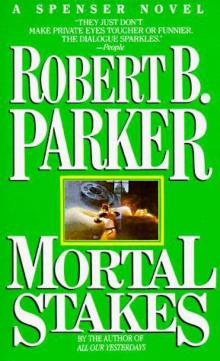 Mortal Stakes s-3
Mortal Stakes s-3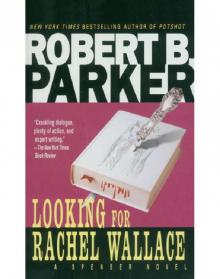 Spencer 06 - Looking for Rachel Wallace
Spencer 06 - Looking for Rachel Wallace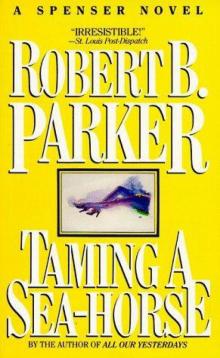 Taming a Sea Horse s-13
Taming a Sea Horse s-13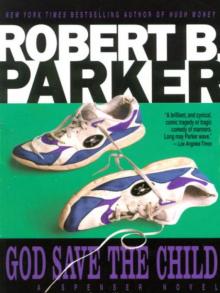 God Save the Child
God Save the Child Chance
Chance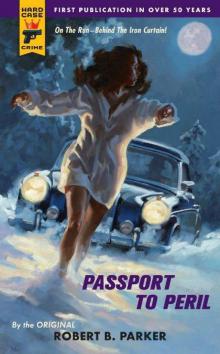 Passport To Peril hcc-57
Passport To Peril hcc-57 Promised Land
Promised Land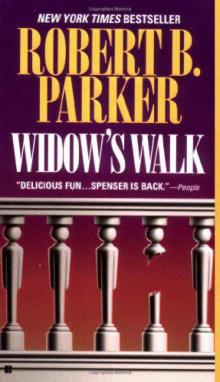 Widow’s Walk
Widow’s Walk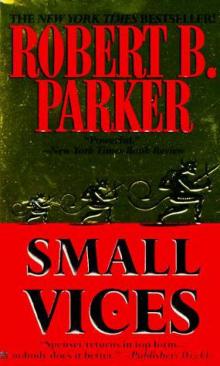 Small Vices
Small Vices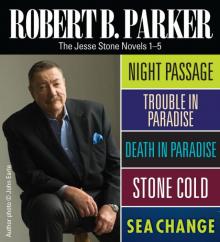 Robert B Parker: The Jesse Stone Novels 1-5
Robert B Parker: The Jesse Stone Novels 1-5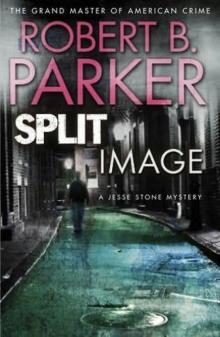 Split Image js-9
Split Image js-9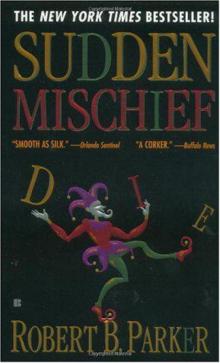 Sudden Mischief s-25
Sudden Mischief s-25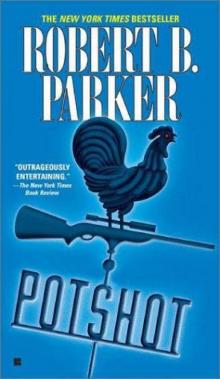 Potshot s-28
Potshot s-28 Split Image
Split Image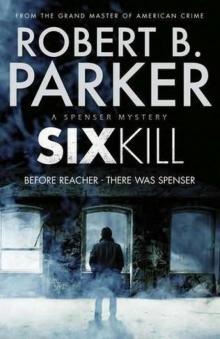 Sixkill s-40
Sixkill s-40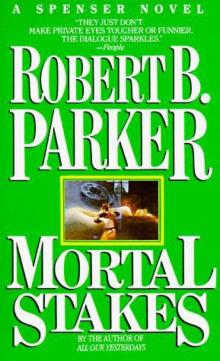 Mortal Stakes
Mortal Stakes Stardust
Stardust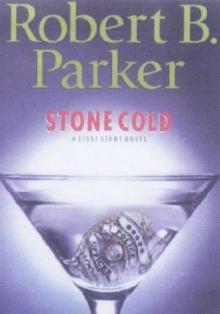 Stone Cold js-4
Stone Cold js-4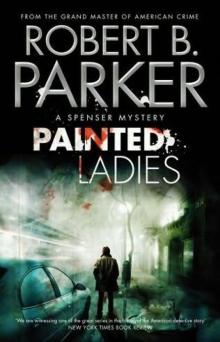 Painted Ladies s-39
Painted Ladies s-39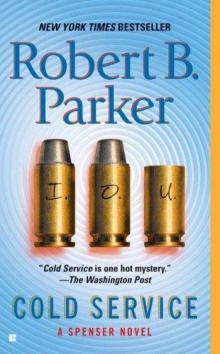 Cold Service
Cold Service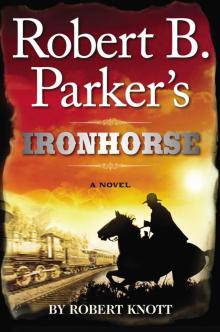 Ironhorse
Ironhorse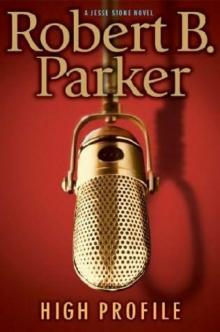 High Profile js-6
High Profile js-6 The Boxer and the Spy
The Boxer and the Spy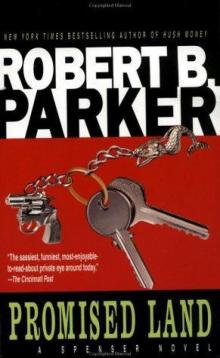 Promised Land s-4
Promised Land s-4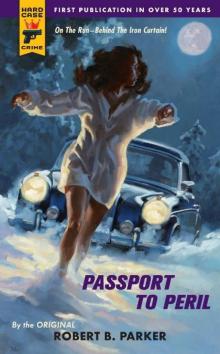 Passport to Peril (Hard Case Crime (Mass Market Paperback))
Passport to Peril (Hard Case Crime (Mass Market Paperback))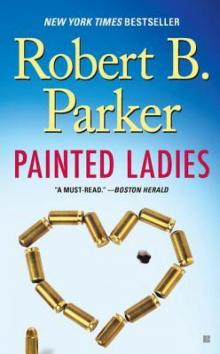 Painted Ladies
Painted Ladies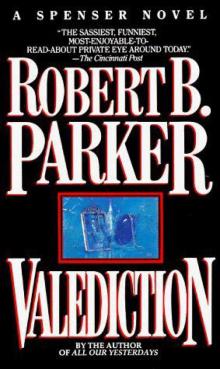 Valediction
Valediction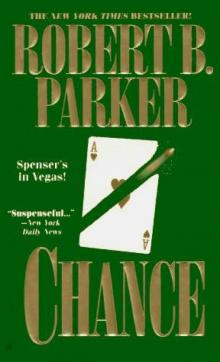 Chance s-23
Chance s-23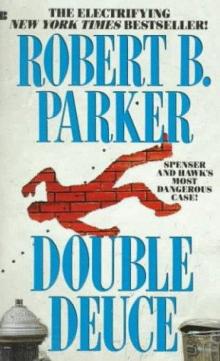 Double Deuce
Double Deuce Wilderness
Wilderness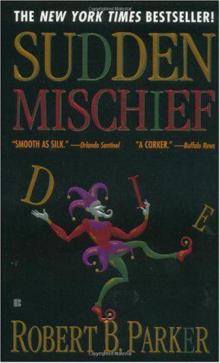 Sudden Mischief
Sudden Mischief Night Passage js-1
Night Passage js-1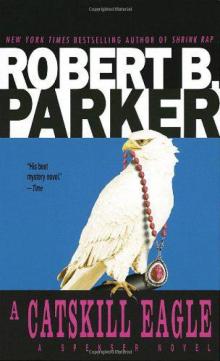 A Catskill Eagle
A Catskill Eagle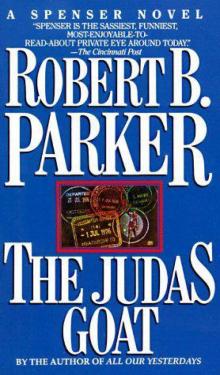 The Judas Goat
The Judas Goat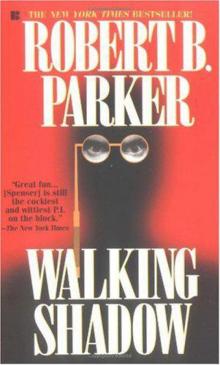 Walking Shadow
Walking Shadow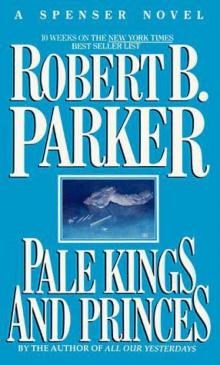 Pale Kings and Princes s-14
Pale Kings and Princes s-14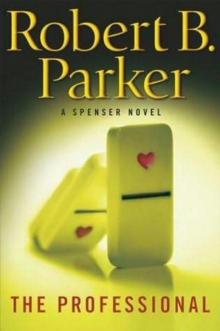 The Professional
The Professional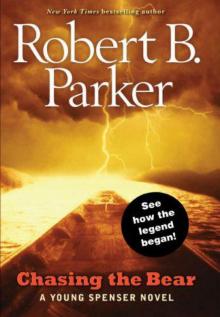 Chasing the Bear s-37
Chasing the Bear s-37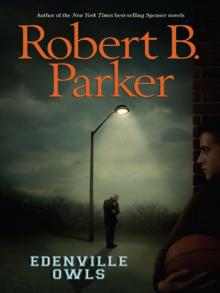 Edenville Owls
Edenville Owls Sixkill
Sixkill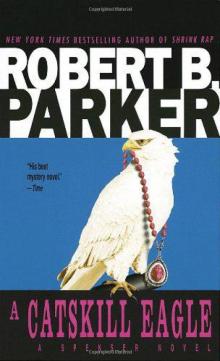 A Catskill Eagle s-12
A Catskill Eagle s-12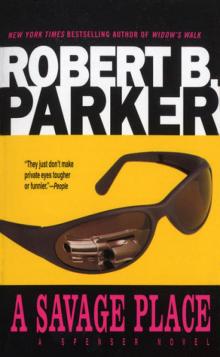 A Savage Place
A Savage Place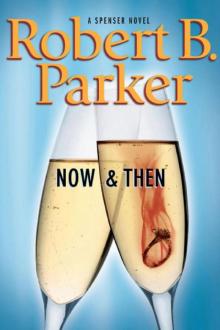 Now and Then s-35
Now and Then s-35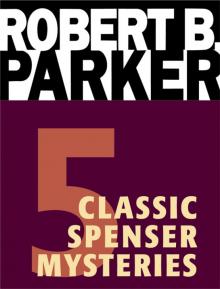 Five Classic Spenser Mysteries
Five Classic Spenser Mysteries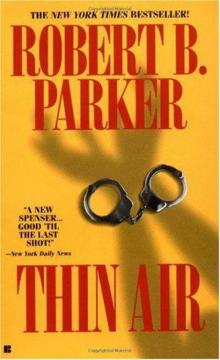 Thin Air s-22
Thin Air s-22